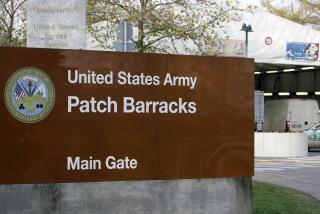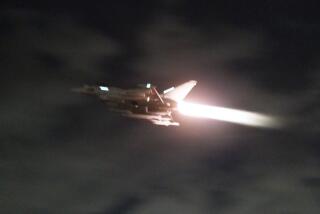Most Immediate Threat to GIs: Terrorist Car Bombing : Security: U.S. forces were placed on maximum alert after warning. They have added sentries and tightened access to bases.
- Share via
SAUDI ARABIA — With Iraqi forces dug into defensive positions across the border, the most immediate threat to many U.S. troops in the region is a terrorist car bomb, military officials said Tuesday.
The officials disclosed that U.S. forces here were placed on maximum alert two weeks ago in response to a warning from American officials of credible intelligence pointing to a possible terrorist attack here.
The heightened security measures, which remained in effect for at least two days, caused units to post extra sentries and to severely limit access to military facilities, the officials said.
It was unclear whether the maximum alert, imposed in response to a bulletin relayed by the U.S. Central Command in Riyadh, had affected all U.S. installations. A military spokesman said he could not comment on security matters.
The new indication of concern over terrorism came as Saudi Arabian officials said that some Yemeni and Jordanian diplomats expelled from the country last weekend had photographed military installations and oil facilities in apparent preparation for a terrorist attack.
At the same time, officials at Aramco, the Saudi-owned oil enterprise, said that at least one hole was cut late last week in a fence surrounding a company facility in an indication of possible surveillance or attempted sabotage.
With the military still haunted by memories of the 1983 terrorist truck bombing that killed 241 servicemen at their barracks in Beirut, Marines said in interviews Tuesday that they are determined to ensure that such an event will not be repeated here.
“You would have to go through a gantlet of fire to reach any significant target here,” Marine Warrant Officer Charles Rowe said of the extensive security arrangements at the facility, headquarters for the Camp Pendleton-based 1st Marine Expeditionary Force.
“Once bitten, twice shy,” said Rowe, who left Lebanon the day before the truck driven by a suicide bomber left the Marine barracks in rubble. “Speaking personally,” he added, “I wouldn’t mind evening the score.”
Lt. Col. Tom Hayden, the headquarters battalion commander in charge of security for the Persian Gulf port complex, emphasized in an interview that, in contrast to the peacekeeping force in Beirut, Marines in Saudi Arabia are well-prepared to defend their facility.
In deliberate contrast to Beirut, Marines at this facility are spread over a number of acres and surrounded by a substantial U.S.-patrolled buffer zone. Jeep patrols carry roof-mounted .50-caliber machine guns, and armed sentries man numerous checkpoints and line the seawall.
But Hayden said that terrorism remains the most urgent threat facing his troops, adding that a car bomb remains its most likely vehicle.
“As far as I know,” he said, “the Iraqis don’t have any forces in place to attack me. What we have to be concerned about is the terrorist threat, and that’s what we’re looking at.”
Among developments that have left some U.S. commanders here apprehensive was the flight into Saudi Arabia last week of more than 1,000 undocumented refugees fleeing occupied Kuwait. Saudi sources have expressed concern that the flight might have provided cover for terrorists to enter Saudi Arabia.
In assessing the threat against him, Hayden discounted the prospect of an attack from sea or air, saying that the “principal threat” is “the vehicle that gets through that gate.” But he pledged: “It won’t happen.”
The security at the Marine facility, the first the military has permitted reporters to survey, did not appear overwhelming. Commanders said they deliberately decided “not to overdo it” so as not to advertise the importance of the facility.
More to Read
Sign up for Essential California
The most important California stories and recommendations in your inbox every morning.
You may occasionally receive promotional content from the Los Angeles Times.












